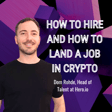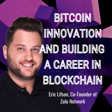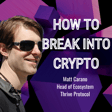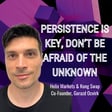Become a Creator today!Start creating today - Share your story with the world!
Start for free
00:00:00
00:00:01

Shane Molidor’s Secrets to Crypto Mastery
Dive into the wild world of Web3 with Shane Molidor, CEO of Forgd, as he unravels the secrets of blockchain success in this Behind The Blockchain podcast episode!
From his decade-long journey through Bitcoin’s early days to leading innovative token launches, Shane breaks down the art of market making, the power of tokenomics, and the gritty reality of landing a tier-one exchange listing.
Packed with insider tips on navigating crypto’s fast-paced cycles, building loyal teams, and seizing emerging trends, this conversation is a must-listen for anyone eager to succeed in the web3 and blockchain space.
Transcript
Introduction to Shane Molidor and Forged.com
00:00:02
Speaker
Shane, welcome to the show. How are you? Thanks for having me, Jack. I'm doing well. Good stuff. Shane, for people who don't know who you are, could you give us a bit of an introduction, please?
00:00:13
Speaker
Sure. So I'm Shane Molidor. I'm the CEO and founder of Forged.com. Forged is a token advisory optimization platform. We offer free software for blockchain builders to navigate to successful token launches and optimize performance post-TGE.
00:00:29
Speaker
um We have about a thousand projects using our free software. We also offer boutique consulting for more blue chip projects where sort of roll up our sleeves, get our hands dirty and operate as an extension of their core team, help them on their journey to TGE.
00:00:45
Speaker
um I've been working professionally in the blockchain space for about 10 years now, mostly on the call it capital market side of things. i' Happy to dive in a little bit on that background, but um been through a couple of these exciting cycles in the market to say the least.
Shane's Blockchain Journey: From IBM to the Winklevoss Twins
00:01:02
Speaker
Nice. Well, yeah, I'll pick your brains about all of that in in just a sec. um 10 years, you're pretty much an OG at this point. I'd say so, yeah. um Got involved back in 2015 when it was really still just ah Bitcoin.
00:01:19
Speaker
um And this was a a very nascent asset class. And obviously, things have evolved at an incredibly rapid pace, but very much enjoyed my time in the ecosystem.
00:01:32
Speaker
Cool. could you um Could you talk us through your career journey so far? So what's led you to this point? Give us a bit of an idea of yeah your background and what's led you here. Yeah, absolutely. So out of college, I moved to New York City. I went to school out in the East Coast at Princeton University. And I joined a a tech giant, IBM. I served as a management and strategy consultant and dabbled a bit in technology consulting.
00:02:01
Speaker
um It was there that i first got introduced to bit Bitcoin from sort of like the cypherpunk community, um but just really more of like a ah hobby, intellectual curiosity.
00:02:13
Speaker
um Like many people that go into consulting, think I was quickly disillusioned by sort of the career opportunities that it would allot me. And so I was looking to transition into venture capital, VC.
00:02:26
Speaker
And between interviews with firms, I, by happenstance, got put in touch with the Winklevoss twins who were gearing up to launch their fully regulated cryptocurrency exchange, Gemini.
00:02:39
Speaker
I met with them. um We really hit it off, kind of became kindred spirits. They were looking to hire a customer support specialist, someone that was willing to kind of mop the floors one day and act as a CEO the next as they communicated it.
00:02:53
Speaker
And I jumped at the opportunity to to work at Gemini. At that point, again, crypto was a very nascent asset class and I was just more so interested in working at more of a ah financial and technology tech startup. um Really embraced the opportunity, worked at Gemini for a couple of years, customer support, business development, sales, data analytics, finance, really kind of doing anything that that required support.
00:03:26
Speaker
um In 2017, I caught the altcoin bug. I started doing ICO syndicate investments with some of the contacts that I had made in the space. And that ultimately led me to to move over
Adventures in Asia: Joining FBG Capital
00:03:38
Speaker
to China.
00:03:38
Speaker
And in China, I joined FBG Capital, which was one of the the premier crypto hedge funds at the time. I built up a speciality in ah crypto market making and over-the-counter trading and eventually came to lead one of their global deaths called FBG1, which was a holistic trading division focusing primarily on liquidity provision for new token issuances, asset management, over-the-counter trading.
00:04:07
Speaker
um Really enjoyed my time over in Asia. um After two years, I was a bit fatigued and wanted to move back to the States. So I ended up joining one of FBG Capital's portfolio companies.
Leadership at BitMax and Bridging East-West Markets
00:04:20
Speaker
It was small upstart exchange known as BitMax at the time, eventually rebranded to AscendX. Started in business development capacity, eventually became more intimately involved in product and technology.
00:04:31
Speaker
um Did a big fundraise, raised 50 mil at roughly half a bill valuation. And part of the contingency of that fundraise from the investors was that I take over as CEO. So operated as chief executive officer of that exchange for quite some time, navigated through some very turbulent market conditions until 2023, really felt a drive to start my own thing. And ultimately, that vision evolved into what is now Forge.com today.
00:05:00
Speaker
Cool. you ra You've had a quite some journey over the last 10 years. I'd say so. A bit exhausting and and a lot of turbulent market cycles, but came out on the other side having, I'd say, a bit wiser and a bit more gray hair as a result.
00:05:18
Speaker
nice Nice. Well, um there's probably quite a few quite a few answers to the next question I wanted to ask you. But are there any particular challenges that really surprised you throughout that journey?
00:05:31
Speaker
Loads, I would have thought, but any that really stand out to you as maybe a defining one, potentially. I would say Coming into crypto, I had a very stubborn and dogmatic personality of, know, I'm going to be ah sponge, but as long as I surround myself with smart people, the lessons learned will then persist throughout my career.
00:06:00
Speaker
And so when I... worked at Gemini at a very Wall Street style of approaching crypto. you know, institutional wave is coming, um ask permission rather than forgiveness.
00:06:13
Speaker
And as a result, it was a bit slower moving, a bit bureaucratic. And It was my belief that you know once I embraced that sort of mantra, that culture, that that mentality would persist throughout my career within Web3.
00:06:29
Speaker
And I think I was a bit too stubborn. um When I moved to China, I very quickly realized that that mantra was really not what any of the successful companies in Web3 were doing. Instead, they were embracing more of the be agile, be iterative, move fast, break things, um really taking advantage of the trends that exist in Web3.
00:06:55
Speaker
And I very quickly learned that in order to keep up, I had to... discard that way of thinking and adopt a more Eastern perspective.
00:07:06
Speaker
um That perspective, i think, has its trade-offs. right It's difficult to build more sustainable, robust businesses in the East. I think that we see high highs and low lows of Web3 projects and companies that are launched in the East, whereas Western companies tend to have a little bit more staying power, um high integrity, strong fundamentals.
00:07:28
Speaker
And so i would say that I swung very far on the spectrum to Eastern perspectives, once again, believing that this was the way, only to then realize that actually the proper way to approach things might be take a nip bit more of a balanced approach, be willing to embrace Eastern philosophy as well as Western ideologies in equal parts and sort of operates, again, along that spectrum in a fluid capacity. but Yeah, I would say just I was a bit too stubborn and dogmatic coming into the industry. And I think in order to succeed, it takes a certain degree of flexibility. For sure.
00:08:10
Speaker
you think that's an equilibrium you've been able to keep when you've been launching Forge?
Launching Forge: Balancing Hype and Business Fundamentals
00:08:17
Speaker
Yeah, absolutely. I mean, i think... You have to be willing to move fast and break things. um These market cycles are ah so rapid.
00:08:28
Speaker
they They come and go sometimes in months, not years. And so you have to be willing to build aggressively to respond to the needs of projects within each of these market cycles.
00:08:41
Speaker
So that's very much an Eastern philosophy. But From the Western side of things, I am a firm believer that um despite the rise of like meme coins, attention tokens, and you know things that blatantly don't have utility or fundamentals, I still believe that projects need to focus on building sustainable businesses that are high integrity and built to last rather than just leaning on narratives.
00:09:08
Speaker
And that's definitely much more of like the Western philosophy. And so that is critical that we we coach these blockchain builders in more Western philosophies. We build the company with more Eastern philosophies just because the needs of the industry are constantly changing.
00:09:26
Speaker
Yeah, for sure. say i mean, i speak to a lot of founders, a lot of builders, ah been in recruitment, as you can imagine. And um I meet some founders who have an idea, they're building really strong foundations, they're building it slowly, properly, building the real fundamentals of their business and their product.
00:09:44
Speaker
And I get other founders who are chasing the narrative all the time and want to build 50 different things and try and ship them all at the same time and this kind of stuff. um I've always wondered, and that maybe maybe there isn't a particularly right or wrong way of of of ah doing it to get success, but I've always wondered what is the the better way. but By the sound of it, you need a mix of both a bit.
00:10:09
Speaker
I think it's like very much like the um left curve, right curve, mid-curve meme, um at least in my experience. And like we kind of have this philosophy that we talk to founders about and say, like, let's be honest, like token price performance is probably more important than any sort of technology that you're going to build because In crypto, price performance is sort of like the ultimate and user experience. Price goes up. Everyone is very happy.
00:10:36
Speaker
ah People believe that your fundamentals are strong. Your token has strong utility. Price goes down. People think that you have busted fundamentals, that the token utility is ah deteriorating or that like devs are rugging the project.
00:10:50
Speaker
That's just because in crypto, like we don't have standard reporting mechanisms or proxies or fundamentals in order to perform proper analysis on a the equivalent of a publicly traded company.
00:11:01
Speaker
And so price is what we use as a heuristic to assess fundamentals. I find that kind of like the left curve that's just obsessed with price um tends to actually perform pretty well, at least in the short term.
00:11:16
Speaker
It's definitely not sustainable. um The mid curve that focuses too much on like building a sustainable business tends to not accrue enough value back to token holders within their ecosystem um to really generate enough interest for people to buy into their vision.
00:11:35
Speaker
you know They're obsessed with like the Web2 way of doing things, and that's not that interesting to most of crypto retail. The right curve understands that sustainability is a function of like really solid and robust tokenomics and demand drivers, value accrual mechanisms.
00:11:55
Speaker
But they also understand that they need to play kind of like the short-term hype game. in order to generate enough speculative demand to facilitate very successful launches.
00:12:07
Speaker
And so again, left curve and right curve both have this obsession about like price is the ultimate UX. Right curve is more sustainable there than left curve, but you definitely can't be a mid curve in order to succeed in the space.
00:12:24
Speaker
Good advice. It's a crazy industry we've chosen to work in, isn't it really? Oh, yeah. um Wild. My wife um certainly wishes that I did something a little bit more relaxed so that I could have nights and weekends back, but um I wouldn't have it any other way.
00:12:41
Speaker
Nice. Well, Shane, there's a few mysteries. in web3 but i'd love for you to try and give us a bit of a crash course on if you're up for it sure um firstly market making for people who don't know don't know what it is uh what market makers do could you give us a snapshot of what a market maker is and how it works Sure.
00:13:09
Speaker
um So market making at a high level. A market maker is a institutional trader that provides two-sided liquidity. So a patient willingness to both buy and sell an asset.
00:13:23
Speaker
As a consequence of that liquidity, they facilitate more efficient price discovery, which is a fancy way of saying that you know someone that is impatient that wants to buy or sell can buy or sell what they want, when they want, at an efficient price.
00:13:37
Speaker
So highly liquid markets tend to be highly correlated with high trade volume, meaning that anytime someone wants to trade in size, they can do so without inducing slippage or market impact.
00:13:49
Speaker
um In contrast, low liquidity markets tend to be significantly less active because the user experience is suboptimal. Can't really buy and size at a fair price.
00:14:01
Speaker
Now, market makers exist in traditional markets as well as Web 3 for mature assets. And in Web 2, in traditional finance, a mature asset is generally one that is publicly traded.
00:14:16
Speaker
So liquidity exists organically and market makers provide liquidity simply because it's profitable for them to do so. Now in crypto, there is a niche industry that has sprung up ah called market making as a service. And that's where a trading institution is actually engaged by a blockchain project that intends to issue a token.
00:14:41
Speaker
And that institution serves as a ah provider of liquidity for that native token once they conduct their token generation event. The goals ah of that service provider are the same as traditional market making.
00:14:56
Speaker
provide two-sided liquidity to facilitate efficient price discovery and potentially catalyze trade activity for the native token.
00:15:07
Speaker
But their core mandate lies with this notion of you want a positive user experience for anyone that is going to buy or sell your asset.
00:15:18
Speaker
Therefore, you need a patient provider of liquidity. The market in newly issued tokens in Web3 doesn't present the same profit opportunities for market makers to allocate their own principal balance sheet to provide two-sided liquidity.
00:15:35
Speaker
Therefore, this niche business line within Web3 has sprung up wherein there are very nuanced incentives that are offered to these market makers in order to encourage them to allocate the time, energy and resources to provide liquidity for a two sided, two sided liquidity for a newly issued token.
00:15:57
Speaker
Nice. And if you're project, how do you how do you choose the right market maker? It's a great question. um Historically, projects have relied on anecdotal evidence and gut instinct from the rumor mill in order to determine who the best market maker is, um which is frankly always struck me as odd since market making is trading at its core. Trading can be very easily quantified.
00:16:26
Speaker
um One of the things that we're pioneering at Forged is providing much more transparency and data-driven insights on who the best market makers are. So, for example, one of our products that's utilized by hundreds of blockchain projects is the ability to engage market makers in a competitive request for quote RFQ process.
00:16:49
Speaker
And how we facilitate that is we actually have integrations with all of the leading market makers. So if you're a blockchain project, you can submit a request for quote. And once you do so, the market makers can actually access their own independent app and bid on these deals and compete against one another in a fully transparent and lit marketplace.
00:17:11
Speaker
So we're not a broker. It's purely technology driven. Now, when the project is reviewing these quotes, alongside insights on the proposal itself, they can see insights on the market maker's historical performance.
00:17:25
Speaker
And that data is fed by what's called our market maker leaderboard. The market maker leaderboard is fed by historical data and ongoing data that we require each market maker to provide about their current engagements.
00:17:39
Speaker
So we can tell you who the best market maker is across a variety of metrics. How robust is the depth that they're providing? What sort of volume as a maker versus a taker are they conducting?
00:17:50
Speaker
the tightness of their spread or even their historical adherence to KPIs. So our approach is very data-driven. um In the same way that we can go to CoinMarketCap and very easily determine what are the best exchanges based on volume or liquidity, um you can go to forge.com and see who's the best market maker based on purely quantitative metrics.
Market Making in Web3: A Data-Driven Approach
00:18:16
Speaker
So that's our approach. Again, I would say that that's kind of a much more nuanced and new age way to think about it. um Historically, again, it's been finger to the wind. Who do I feel most comfortable with and who had the most productive sales meeting with me?
00:18:33
Speaker
Yeah, that's cool though But I guess if, yeah, if you guys are putting it all in one place where projects can actually see the proof of what what these market makers have done before, I mean, that takes quite a lot of the pressure off them, I guess, because making a decision based on a sales call is just an emotional feeling, right? Who made you feel the best and who did you gel with and Yeah, but to actually see the proof of what the what the the projects or the market makers have done.
00:18:58
Speaker
um Yeah, and it's so I think it's tough. I mean, historically, you know you want to go public in Web3, i.e. issue a token. Let's be frank, you're you're the equivalent of a seed stage or pre-seed company.
00:19:13
Speaker
um You need to focus on building good product, shipping good tech. However, historically, blockchain projects and blockchain builders have been expected to become masters of market microstructure, um which is just oftentimes a ah skill set so foreign to them.
00:19:33
Speaker
And if you look to Web2 and traditional finance, companies that are preparing to go public via an initial public offering or even a direct listing, they don't have those same sorts of expectations, right? They would sort of offboard those responsibilities and duties to an investment bank, an underwriter that is the subject matter expert and can serve as a sophisticated institution to guide them on their path to becoming a publicly traded company.
00:20:00
Speaker
um So it is very difficult for Web3 founders to really know what they're looking for um or how they might potentially be taken advantage of when it comes to launching a token in Web3.
00:20:16
Speaker
Million percent. And on top of that, they're also trying to build the product, trying to design the product, also trying to be marketing experts at the same time ah as well being an expert on tokenomics and and and launching a token and stuff. Right. So, um yeah, it's ah it's a tricky role. um you You guys, I think we've spoken before, you guys have a all sorts of different ah tech, right, that you build and launch into the market.
00:20:41
Speaker
um Correct. So yeah, not just on on the market making side from from what I understand. um Could you talk us through maybe some of the other stuff that you can help with?
00:20:52
Speaker
Yeah, the market making tech is popular, but it's far from our most popular tools. I'd say our most popular tools are actually related to tokenomics. We have a free to use software tool called Token Designer, which allows any blockchain builder or researcher to build all aspects of their tokenomics from scratch.
00:21:11
Speaker
and then to battle test those tokenomics using quantitative simulations that and dictate what might happen if you were to launch in the current market conditions, taking a look at your token price, your market cap, and your fully diluted valuation.
00:21:26
Speaker
All throughout this product, we have educational resources to give insights about how these models work and best practices from other competitors. You can emulate data from competitors, think over 500 projects within our database.
00:21:41
Speaker
And once you've fine-tuned this tokenomic design, you can actually publish a white paper with one click directly from our website. And so this is immensely popular for um early stage founders to get a better sense of you know how they want to share and distribute value in their decentralized ecosystem, model out supply and demand.
00:22:03
Speaker
um And it's definitely a... a significant step up versus the the messy Google spreadsheet that most founders are accustomed to. the Token Designer is immensely popular. We also have tools that give you insights on the exchange listing process, for example, fees, historical performance. You can even automate official due diligence and application questionnaires on Forged. And then post-launching, we sort of evolve it into more of a business analytics platform. So you can use us for
00:22:37
Speaker
monitoring liquidity from your market makers and ensuring that you're maximizing value from the engagement and that they're adhering to contractual obligations. You can track token unlocks and inflation and see the correlation of inflation to your token price.
00:22:52
Speaker
um You can optimize token demand drivers. So there are a large number of free to use software products. And the vision is just to become end to end that everything that you need to prepare for launch and then optimize performance post launch is accessible from a single dashboard and it's all for free.
00:23:11
Speaker
That's very important to me. That sounds really cool. um I was going to ask you, actually, you've you've mentioned two things there, two of the other mysteries so I was hoping you might clear up.
Challenges of Exchange Listings and the Role of Tokenomics
00:23:22
Speaker
um Firstly, the first thing is What does it really take to get listed on a tier one exchange? Because I hear some numbers flying around all the time about numbers of followers you need to have, active community, the amount you have to maybe pay them ah to get on.
00:23:39
Speaker
Could you clear it up? what how do you How do you find the the unicorn of the tier one exchange listing? Sure. So... I guess if I was to say, provide a response in jest, what does it take? It takes persistence and it takes a deep understanding of Asian cultures in order to navigate exchange listings on the best exchanges. So let's be clear. What are the best exchanges to list on?
00:24:05
Speaker
It's not the Western exchanges. So it's not Coinbase, Kraken, Gemini, ah Bitfinex. It's the Eastern exchanges that cater to more of a speculative retail demographic.
00:24:18
Speaker
And in order, the best exchanges, in my opinion, would be Binance, Upbit, OKX, Bybit, Gate.io, KuCoin, MEXC, and then kind of a handful thereafter.
00:24:34
Speaker
But these are altcoin exchanges that are essentially treated as casinos by retail speculative investors. And so that's what you want to navigate. And those are all very, to their core, um more Asian cultures that drive them.
00:24:50
Speaker
And so a lot of Western teams struggle to navigate this listing process. right they You'd expect these are massive institutional players, some of the most successful profitable businesses in crypto.
00:25:02
Speaker
You would expect that there's a very regimented structure of what they need to see and clearly defined requirements. There's not. You're still um yeah kind of shooting the shit on a Telegram chat, in many instances walking blind as to what they want to see.
00:25:20
Speaker
Now Forged has collected enough data that we can identify some of the the recurring themes between successful projects. And one thing that's very clear to us is that fundamentals and traction within your decentralized ecosystem do matter.
00:25:36
Speaker
And that exchanges are getting better at seeing through nonsensical farmed metrics. For example, with the rise of you know airdrops and point systems in this recent cycle, you get a lot of fabricated metrics on your test nets that don't really showcase real user traction.
00:25:56
Speaker
So exchanges are indeed looking for user traction and proof that users are actually allocating capital to be part of your ecosystem, which is why things like TVL, trade volume, transaction fees are really, really important proxies for centralized exchanges.
00:26:14
Speaker
um Beyond that, I think experience does matter a lot to these exchanges. We have to remember that Despite the exchanges based on their name simply being marketplaces, um in crypto exchanges are much more than that. They're their're exchanges, they're custodians, they're matching engines, they're clearing agencies.
00:26:38
Speaker
And they're also sort of perceived as investment advisors to their community. When Binance indicates that they're going to list a new project, people see that as a stamp of approval, that this project is going to perform well.
00:26:51
Speaker
And because the retail has that that sort of inherent belief, the exchanges need to try really, really hard to ensure that new listings are going to be successful.
00:27:03
Speaker
Therefore, the exchanges like to work with teams that have done this before and shown historical success. and So in addition to the underlying fundamentals and traction, historical track record means a lot.
00:27:17
Speaker
Beyond that, I do think that this is ah big part popularity contest, right? How much buzz and hype is there in the ecosystem? And that's equal parts, you know, what caliber of venture capital firms are backing you, what angels are on the cap table, and then is crypto Twitter buzzing about you?
00:27:35
Speaker
Are the DGEN Discord chats talking about you and excited for your launch? That means a lot because, Crypto is a virtuous feedback loop. If people believe you're going to be successful, then they're going to be lining up in droves to purchase the asset when it lists. And that buy side demand is going to catalyze exciting price performance.
00:27:55
Speaker
And price is our only proxy of project quality. So um yeah, I would say that's kind of like high level in no particular order what the exchanges are looking for.
00:28:06
Speaker
It's quite a lot to think about when you're looking at going for an exchange listing, right? It's an exhausting process. Exhausting process and don't even get me started on the fees that you'll pay to to list on the the top caliber of exchanges. But yeah, it's it's often um underestimated how intensive this process is for founders that are simply focused on shipping good product and good tech and sort of neglecting these aspects of the go-to-market strategy.
00:28:37
Speaker
So I think a lot of founders would think that if we have a good product, we have good tech, of course, exchanges going to want to list us. um That sounds like only a very, very, very small part of actually what is needed is, as you explained that, to um to actually get listed on these things, to get all eyes on your project, to yeah to to help you do well, I guess. it's um Yeah, that's crazy. Thanks for talking us do that. um There's a lot of things there I didn't yeah didn't even realize. So yeah, thank you ah for that.
00:29:07
Speaker
um Then you mentioned before about the tokenomics ah tool that you guys have. Again, crash course, what are tokenomics?
00:29:18
Speaker
What impact can they have ah positively and negatively would be good to to understand. Can you talk us through it little bit? Sure. um So tokenomics is like a Web3 piece of vernacular that describes how value is shared and distributed within a decentralized ecosystem.
00:29:36
Speaker
like Zooming back. um You create a business and your rationale for creating that business is that there's a problem and you want to solve that problem. When solve a problem, you create value for a particular demographic.
00:29:52
Speaker
And so in crypto, we use tokenomics to describe how we are going to capture that value and share and distribute it amongst our token holders that comprise our decentralized ecosystem.
00:30:05
Speaker
So there are sort of like two main aspects to tokenomics. There's a qualitative side, there's more quantitative side. The qualitative side is really understanding, kind of like, what is the problem? What is the solution?
00:30:21
Speaker
um What is your core business model that is going to potentially generate revenue? How are you going to capture value that you create? How does that value then accrue back to token holders in novel ways?
00:30:35
Speaker
The quantitative side is comprised of your supply and your demand. Your supply, who's going to receive tokens? and So that's your pie chart.
00:30:45
Speaker
And what percentage of the total token supply are they going to receive? We call this a token distribution schedule. And then your emissions schedule. At what rate will those tokens be issued to each group of recipients?
00:31:00
Speaker
And by you know from that, we can back out your rate of inflation or you know as the circulating supply increases. that's the supply side. The demand side um is who's going to buy and hold your token.
00:31:14
Speaker
um And demand in crypto comes from three unique groups. ah The first would be utilities. So that's the essentiality of your tokens. So think maybe you need the token in order to conduct a transaction like gas fees. That's like tokens absolutely essential.
00:31:32
Speaker
Or maybe you need to hold and stake the token in order participate in governance. The next are what we call demand mechanisms. And these are compelling value propositions as to why you might want to buy the token.
00:31:45
Speaker
But you don't need the token. So for example, if I have a company and I say I'm going to issue a token, I've got 100 mil in annual recurring revenue, and I announce I'm going to allocate half of that.
00:31:59
Speaker
to periodic token buybacks. 50 mil in token buybacks is quite a significant amount. So I'm accruing value back to the ecosystem and making the supply constrained.
00:32:14
Speaker
Now, If I'm an outside observer, i might be compelled to buy the token in anticipation of the price performance you know price increasing as a function of these buybacks, but I don't need to hold that token as part of your ecosystem. It's more of a compelling value proposition as to why I might buy it.
00:32:33
Speaker
And last but not least, demand comes from speculation, i the expectation of future returns. And speculation can come from any number um of avenues.
00:32:45
Speaker
um So that would be the quantitative side. Again, the supply, token distribution, and emission schedule, and then the demand, your utilities, your mechanisms, and speculation. That is what comprises tokenomics.
00:32:58
Speaker
um Tokenomics are at the core of what any Web3 founder has to work through in order to unlock all the other opportunities that we've referenced, right?
00:33:10
Speaker
You can't bother um trying to navigate exchange listings or working with a market maker or launching a token unless you have really fine-tuned your tokenomics because that is your core business model and will dictate why anyone would really care why you're issuing a token in the first place for sure I was about to ask you, i think the answer is quite quite obvious. I was about to ask if you think all founders have to have a good grasp on tokenomics and what good tokenomics look like.
00:33:48
Speaker
um yes Yes. Founders do need to have a good grasp. um I think it's just a non-starter if a founder doesn't have a good grasp on tokenomics because that's basically communicating that you don't understand your core business.
00:34:05
Speaker
Now, there are unique aspects of tokenomics related to quantitative simulations. So for example, how does the initial circulating supply and distribution of initial circulating supply and your e valuation at token generation event um How does that influence price performance in the first one day, the first one week, the first one month?
00:34:27
Speaker
and That might require expert advisory services, um and that might be outside of a founder's wheelhouse. But you cannot neglect tokenomics at their core if you want to be successful on Web3. Okay.
00:34:41
Speaker
yeah and Understood. and Is there anything that you... think people should be really aware of before joining the industry?
Career Advice for Newcomers in Crypto
00:34:51
Speaker
Do they need to be really aware of of tokenomics and and how that then affects the rest of the markets? Do they need to be aware of all the different types of exchanges and how to actually buy, sell, trade crypto? Do they need to be aware of you know market making services and and this kind of stuff? like Is there anything that you think super, super key that people should be aware of before joining the space?
00:35:13
Speaker
um I guess like my advice would be pick a niche and become a subject matter expert about it. like There's too much going on in the industry and it moves too fast to try to understand everything.
00:35:26
Speaker
i Back in the day, i used to... know read the white papers of every project that would get listed. It's just too much. You don't have that much mental bandwidth.
00:35:38
Speaker
And so you need to pick something and become kind of the expert in that niche. And then you can expand and become a generalist. So what I'm a subject matter expert for is like the capital market side, because my business is very akin to like investment banking services in Web3.
00:35:56
Speaker
So I need to be an expert in all aspects of go to market and then post TGE e performance optimization. If you're not in that business and you're looking to you know build a new innovative DeFi platform, you don't need to know 99% of what I know.
00:36:13
Speaker
ah You might have to establish subject matter expertise in a particular niche that you want to penetrate, but it's not worthwhile to try to boil the ocean, pick up everything else. So pick your niche, become an expert, and then become more of a generalist after you've broken into the industry.
00:36:33
Speaker
Good advice. Anywhere that you'd suggest that someone could go ah to actually find out what niche they should look at and what they actually find interesting?
00:36:44
Speaker
mean, I don't think I have a revolutionary perspective on that. It's like just figure out what kind of stimulates you intellectually as an individual.
00:36:56
Speaker
on and I think that's where you're going to be encouraged to build up the more subject matter expertise. Yeah. Crypto is tough just because there's there's almost no transparency on like the financial incentives and the upside that exists across you know various verticals. like For example, like are you going to make more money working at a project that issues a new token versus going to work at an exchange versus to work at VC as an analyst? like There's really no transparency. And obviously, crypto has kind of a distorted perspective of wealth, seeing like
00:37:30
Speaker
you know, 13 year olds, you know, make a couple grand off of like shit coin launches on pump dot fun or and seeing, you know, people before their 20th birthday driving in Lambos because they got an early on, you know,
00:37:46
Speaker
Doge or Jivinu. um So I think it's important to have like a level and grounded approach, but also just like pick what stimulates you as an intellectual and then dig in become an expert, then expand to become a generalist thereafter. Okay.
00:38:04
Speaker
Cool. If you were going to start again, say you were going to get your first role in blockchain, think back 10 years, or maybe it might be slightly different now, maybe there's more projects around and more things to look at.
00:38:18
Speaker
um What steps would you go through to to actually break into the industry?
00:38:26
Speaker
It's a good question. I mean, i I had it easy, I guess you could say, and that the space was so nascent that it wasn't competitive. In fact, I used to be embarrassed to tell people that I worked in, and we would tell people that you work in Bitcoin back then.
00:38:43
Speaker
i would say I work at a tech startup. Now it's completely flipped, and i think it's very difficult to to penetrate. um I think the advice that I would give is just to to be tenacious, to to put yourself out there, to, I think, provide value to people. Yeah.
00:39:05
Speaker
I think crypto is very much like give and take. It's not like iBanking or sales and trading in traditional finance where like the standard like coffee chat is acceptable. Like I don't know many people in crypto that are willing to like give their time to help mentor someone just out of altruistic purposes because there's always so much to do and the market's moving so fast.
00:39:27
Speaker
And so like offering yourself up in more of like an intern capacity, I think is a great way to break in provide value and then you might get value as a result i think that sort of advice is probably essential in this market cycle whereas when i penetrated the space again it was much different 10 years ago sure i guess now there's tons of different like bounty programs and stuff right like projects we're always putting out help us with this or create this
00:39:59
Speaker
So notice if a project's just launching, they're saying, right, we need a ton of memes from the community, for example, for our launch, or, you know, they might put out different bounty programs, writing pieces of content, or it could be, you know, if you're a software engineer, you know, we need this this library updating or whatever it might be. I think there's a lot of ways out there that you can add value ah now, for sure.
00:40:19
Speaker
um I think as well, just getting involved in a lot of the communities, I think is is fairly important. It can be quite tough if there's 100, 150 projects that youre trying to that you like the look of. Let's say you're trying to work in DeFi, for example.
00:40:35
Speaker
It's like, where do you even start? like What communities do you join? But I think ah even if you just join a couple of them, make yourself known and people can see your name popping up and you're answering questions people in the community and just like making yourself seen.
00:40:49
Speaker
I think then you're lot more likely to get introduced to someone who's outside of that community, right? And so I might go, oh, you know what? There's a guy or a girl in this community that I'm in, like super, super friendly, like really nice. They've been having a bunch of value. They've been creating stuff the community.
00:41:07
Speaker
I think youre you're quite likely to get referrals and recommendations and stuff but by doing things like that. But um yeah, you're right. I think it is quite difficult to get in the industry now. um Do you think, do you think,
00:41:20
Speaker
think someone needs to try and build up a bank of experience in Web 2 before moving into Web 3? It's a good question. So no, i don't.
00:41:32
Speaker
And this goes to my statement about becoming a niche specialist. If you try to build up...
00:41:40
Speaker
expansive subject matter expertise in web two before focusing on breaking into web three you're going to have a bad time it's just too much to do um because i would ask you know what niche within web two or traditional finance right is it the underwriting process is it uh how high frequency trading works and how matching engines are structured in web two and then you're going to take best practices and then parlay them into web three If so, that's that's a massive undertaking, right? And sometimes you might just be better off just looking, you know, what are the best practices currently in Web3 and how have they evolved over time?
00:42:18
Speaker
Now, I think it makes sense once you've begun to penetrate Web3 to do proper diligence and research on Web2 counterparts because, at least from personal experience, I know that crypto has steadily evolved to emulate and disintermediate a lot of Web2 business equivalents. right like DeFi has pretty been like...
00:42:46
Speaker
play for play in terms of like how decentralized exchanges have evolved in very similar ways to evolution from brokerage to high frequency trading within web two.
00:43:00
Speaker
So I think that gives you a leg up, but certainly don't do yourself a disservice of waiting to penetrate web three until you have built up subject matter expertise in web two. That's just too much to do.
00:43:15
Speaker
Yeah, that's good advice. so think a lot of people would think, well, you know, I need to i need to build up some experience. I need to ah create a set of skills for myself. I need to get some experience behind me so I've got something to offer when going to these ah these projects and stuff, right? But I guess if you, as you mentioned, if you're trying to enter in in more of an intern-style capacity, then I guess maybe then there is less expectation on you for that and more opportunity you to then learn in in projects, right?
00:43:45
Speaker
I mean two ah two of my most valuable employees that I would argue are smarter than me and most things Web3 are college dropouts like that started working with me during internships and eventually...
00:44:01
Speaker
the opportunities were significant enough for them to make a full trend time transition. And I don't think they'll they'll ever have need to go back and get their degrees with the sort of traction that we've had in the ecosystem.
00:44:15
Speaker
um And lot of it's learn on the job. And you know I'm always happy to to mentor employees and share subject matter expertise with them so they can be more effective employees.
00:44:28
Speaker
um in whatever outlet. But yeah, I don't necessarily think that the Web2 experience is ah requisite. You could become a powerful asset you know if you have experience from iBanking, consulting, S&T, or working any avenue of tech, but it's not a requisite by any means.
00:44:50
Speaker
Nice. How did they get those intern roles with you? Do you advertise and they applied for it, if you remember? Uh, networking mostly, um, employees that were working with me, um, connections from their personal network, put me in touch. We were looking for interns at the time. And so jumped at the opportunity and eventually these people just became valuable assets. We really see them as interns in any sense of it.
00:45:18
Speaker
Um, rather valuable research and business development, and then sort of evolved from there. That's fair enough. I think that's another good point ah to raise as well. If someone's looking to get into the industry, in Web3 and blockchain, there are so many events, right? they don't You don't necessarily have to go to the massive ones because they can be quite expensive to travel around to the huge cities around the world and stuff. But even local events, even online stuff, like there are tons and tons of events in our industry that I think if you start to get involved in those events, start making friends there,
00:45:53
Speaker
Obviously, as you you just said there, some of your employees referred in people that they know and connections and friends and that kind of stuff. And and now they're able to to get roles. I think if you're trying to break in, trying to show your faith at some events and try and make friends in the industry, I think is a real powerful way to to go about it.
Networking in Crypto: Local vs. Large Conferences
00:46:12
Speaker
Yeah, it's interesting. I mean, I wouldn't even say that I'm like someone friendly in Web3. don't really like going to to social events. Maybe I'm a little bit jaded from that. um But if I was looking to break in and I didn't have existing relationships, um I think local events are definitely more effective I've found that like the crypto conference is, again, I'm probably pretty jaded, but you know it's it's a lot of um people hanging out with already their core circle at events and drinking and partying and that sort of stuff. And so...
00:46:52
Speaker
I at least know when I do have to go to those, i don't necessarily want to be pitched by someone that wants to work for me or someone that wants me to invest in them. um That comes across as like a little hokey. But definitely like the the local events, the local meetups like during the week where it's just like,
00:47:12
Speaker
a bunch of dgens getting together and just kind of like putting their heads together and vibing like that is i think a really good opportunity to build relationships for sure and if it doesn't exist uh create it i guess someone needs to start these things right so if maybe one doesn't exist if you're listening to this and an event doesn't exist in your local area maybe give it a go i'm sure people would be up for it yeah um i'd say so but so So say if someone is already here, already working in the industry, can you share any advice for how they can make sure that they build a, or try to build a successful career for themselves here?
00:47:50
Speaker
Sure. There's a mantra that I always used to communicate to my employees when I was CEO of an exchange, and it comes from ah pretty popular crypto VC.
00:48:02
Speaker
um It's on Twitter. They're called CMS Holdings. it was founded by three individuals that were like crypto OGs and were mentors to me when I was at Gemini.
00:48:14
Speaker
And they say, do you want to make money or do you want to be right? And it's kind of a humorous phrase, but at its core, i think what that that phrase is getting at is, know don't be so skeptical of new innovative tech and trends that may seem obscure to you from your perspective.
00:48:39
Speaker
um Way too many times I have discredited new waves of innovation, new trends in crypto, just because my preconceived notions say that's dumb.
00:48:52
Speaker
like I didn't take advantage of the meme coin cycle nearly enough because i think a lot of it's dumb. I hopped on like the NFT cycle way too late because it was like, this is stupid.
00:49:06
Speaker
you know It's like pet rock type of thing. But then even expanding it further and you know discrediting more like DeFi innovations, because from my perspective, having been in the trenches at exchanges, market making desks and really understanding capital markets, I didn't think that these trends were that innovative. So I missed that cycle.
00:49:26
Speaker
and so Really embodying that, do you want to make money or do you want to be right? um Don't be so quick to doubt new trends as they gain popularity. Lean into them a little bit, throw away your preconceived notions and see where it might take you.
00:49:44
Speaker
I think that's really, really important for someone that's in the industry just because, again, these cycles come and go so quickly. So you can't be so dogmatic and stubborn and set in your ways that like, this is the truth and this is the only way to get to the top of the industry or the only thing that retail demand is going to get behind.
Future of Crypto: Returning to Fundamentals
00:50:06
Speaker
Oftentimes it comes where you least expect it. And these trends certainly will not always align with like your core ethos or hypothesis about how the industry will evolve. So yeah, the advice is, do you want to make money or do you want to be right?
00:50:21
Speaker
I like that. going to, yeah, I'm going to take that on board myself actually. um Cause I missed, I got involved a little bit in the NFT.
00:50:32
Speaker
That was in what 2021 was it when when all that was kind of kicking off. um ye um I miss the meme coin. So yeah, this whole kind meme coin craze as well, to be honest, I caught the back end of it. But again, I didn't really get involved in in that too much either.
00:50:48
Speaker
um yeah, I'm gonna take on board myself. That's some that's some good advice. um
00:50:55
Speaker
If you know, what's the next one you're not gonna miss? What's the next trend you're seeing? Well, if I knew I'd be at a beach somewhere, probably, and sipping a pina colada.
00:51:09
Speaker
I don't know. I think that like we're starting to see much more stronger correlation um between Web 3 and Web 2 macro market trends. I mean, the... tariff announcements, the trade wars and everything, I think is like clear indications of that.
00:51:25
Speaker
So i think there's a ton of uncertainty in the market, right? Had we had this podcast scheduled a day prior before the pause on the tariffs have been announced, my outlook would be much different on the macro market than it is today.
00:51:40
Speaker
And so I think
00:51:45
Speaker
having the proper preparation for maybe a prolonged bear market is important. um Maintaining dry powder to buy the dip, um as they say, is important.
00:51:58
Speaker
And then gearing up for what that next cycle is. I think that it will be kind of like a flight back to fundamentals. um This last cycle was a lot of meme coins, a lot of attention tokens, a lot of this notion that, you know,
00:52:14
Speaker
price go up in terms of purely speculative capacity, people like ingest making the equivalent of meme stonks with like Fartcoin and others that truly are just so absurd.
00:52:26
Speaker
And so I imagine that this next cycle is going to be like a... Again, a flight back to quality, a flight back to fundamentals, strong core businesses, proper demand drivers, real revenue generating businesses that accrue value back to token holders. So Infra plays DeFi platforms with compelling demand mechanisms is like my hypothesis on what comes next.
00:52:51
Speaker
Okay, nice. Let's see how it plays out. Oh, yeah. um So Shane, if um we've touched on if someone's breaking into the industry, if someone's already here, what if ah founders are looking to grow their teams?
Mentoring and Retaining Talent in Web3
00:53:08
Speaker
I'm sure you've hired tons of people over the last however however many years you've been in and those types of roles. um What advice could you share for finding the right people?
00:53:19
Speaker
It's a good question. So I have a pretty biased perspective is that finding people always work with a recruitment agency.
00:53:33
Speaker
um For me, it's more about mentoring and keeping the right people. And what I've found in web three is that Because it moves so fast, oftentimes employee development is neglected.
00:53:48
Speaker
And I think the consequence is that many employees in Web3 don't have as much loyalty to any single entity, is that it's become very commonplace to have people jump around to projects, like multiple times per year.
00:54:06
Speaker
And I think that used to be embraced, and we're kind of getting to this point where like, People don't see it as um that appealing. It's like you're a serial grifter, like, oh, that didn't work out. So now you're jumping to the next project and aiming after 100x.
00:54:23
Speaker
Can't really call yourself a core contributor if you're truly just you know aping into the next thing, trying to you know make your millions. And i don't think that we should ding the employees for that.
00:54:39
Speaker
I think the onus should be on the employer. Give them a reason to stick around. Yes, people are interested in financial well-being, and can only do that if you have a successful business.
00:54:53
Speaker
um But also, I think mentorship is really important. And That's big for me is that employees that come work for me, especially those in a business development capacity, I really make an effort to share subject matter expertise and educate them.
00:55:11
Speaker
And i joke with them. I say, look, I'm not doing this out of altruistic intentions. I'm doing it because I'm profit motivated. If I can make you an expert, you're going to do better work for me. If you do better work for me, the company is going to be more successful. Yeah.
00:55:26
Speaker
And so that aspect of mentorship, I think, is like a very Western um philosophy, um getting that alignment with the the individual building up a relationship, but then I think doubling down and taking a more Eastern approach as well is that if an employee provides value to you and the company, you need to compensate them in an amount that's commensurate with their value add.
00:55:51
Speaker
Because what good is professional development and career development if it doesn't result in financial well-being? And I think that's what drives most people is that you know Maybe they're not materialistic, but they do want to provide for family, for friends to do nice things.
00:56:09
Speaker
And so put your money where your mouth is. If someone's providing value, you need to pay them, but also mentor them. And don't do it out of altruistic intentions. Do it because they're going to provide more value to the to the company.
00:56:24
Speaker
And so I think in my experience, I've been blessed that I have very strong loyalty of my employees to align with me. And that significantly reduces attrition of these people that are going to jump from one thing to the next.
00:56:40
Speaker
allows me to really, really focus on building core technology and innovating my company, yeah whether it be at Forged or had it been at Ascendex, the centralized exchange or and FBG Capital.
00:56:53
Speaker
That's a really, really important cornerstone, i think, of being an employer in Web3. Yeah, I think you're i think youre completely completely spot on there.
00:57:05
Speaker
It's something that's overlooked massively, like retention strategies in Web3 businesses. In Web2, it's like one of the main cornerstones of the HR and operations function, right? It's to look at how can we develop our employees, training, the professional development, the mentoring, the businesses. Can we get external mentors? Like what what can we do to to keep people?
00:57:28
Speaker
In Web 3, at least. Yeah, I mean, there's a stigma in Web 2 as well. It's like if you have enough or too many entries on your resume, it's not a good look. And in Web 3, I think that it's...
00:57:41
Speaker
That has sort of been given a grace period is that like it's accepted like, oh, you are a core contributor on multiple projects. And like, that's kind of a clever way of saying like, you're a grifter, like you jump from one thing to the next.
00:57:55
Speaker
um And so I think that that's going to change. But again, I think the onus is on the employer, not the employee to give back a little bit more, give them reason to stick around.
00:58:06
Speaker
Yeah, for sure. I think that already has changed um the amount of requirements I work on where, you know, I get asked, you know, if someone has only worked it, unless there's reasons for it, like redundancy and that kind of stuff, which is obviously outside of people's control. But If people have hopped around purely for the sake of hopping around, get asked, you know, we we don't want to see those types of profiles.
00:58:27
Speaker
We want to see people who have stuck at something for for a long period of time. And actually, I get people talking to me who might have been in a role for three, four, five months. They're at the start of their careers and they go, yeah, you know, I've reached the ceiling. I want to look at something else. I'm like, have to say to them, you haven't reached the ceiling after five or six months that you just haven't.
00:58:46
Speaker
um I can guarantee there's other stuff that you can you can do and you can get involved in. um So yeah, you'd be surprised. ah Actually, yeah, the projects that say they don't want those types of profiles, but the amount of people who are still in that mindset of trying to hop around a bit.
00:59:03
Speaker
Yeah. But um yeah, the only should be on the company to to retain people, right? Like you make a role so good that they don't want to leave and do anything else. Yeah. And again, pay them. Like that's a big component for me that I learned from being in China is that like they don't bother with like the whole,
00:59:21
Speaker
um yeah you're here ah for the betterment of the company and you should take pride with that. It's like, you do good things, you get rewarded. And you know at Forge, that's the case for all of my employees. like ah Everyone either has equity or an eat what you kill structure. And if you're a developer, your eat what you kill is based on your development prowess on a quarterly basis. You build good things, I'm going to give you bonuses.
00:59:46
Speaker
um And again, that's just very important. I think it's increasingly important with... remote work becoming kind of the new standard is that, let's be honest, any employee, if they wanted to, could be a fractional employee. you know Hop into the one-off Google Hangout or Zoom meeting, show face, ship a little code, but they could have a million other side projects. And that's fine in theory, but what I think drives them is saying, if you focus your time, energy, and resources with me, you're going to make more money. So why would you want to bother with all that other bullshit?
01:00:21
Speaker
ah just Just double down and focus on building for me and I'll take care of you. And again, I think that the onus is on the employer to incentivize the employee that drives more retention.
01:00:35
Speaker
Yeah, for sure. It's tricky, right? in ah In a remote world, because I think when but everyone was in the office way back when, ah whenever that was a few years back, I you built such good friendships and relationships with your colleagues that actually one of the main reasons that you probably saved in the job is because you're working with all of friends, all your friends, basically.
01:00:57
Speaker
So actually going fully remote, I think companies or projects need to look at, or how can we actually retain people? Because there's a level of loyalty that isn't built remotely, ah the the same as it is face to face. So yeah, i mean, you obviously with the incentives and coaching and mentoring, that kind of stuff, like that builds that base level of of loyalty with with employees that, you know, they want to stick around and, you know, they want to build good stuff because they back about the company about you about the teams and stuff right yeah i mean again like money talks like i've talked to so many founders or people that are at c-suite level they'll talk to me and say you know it wasn't until after you know we had our first good year and i distributed first round of bonuses to core contributors that i realized like it actually feels good is that it feels good to pay people
01:01:49
Speaker
um you feel as if it's it's an aggressive reinvestment into the company's success. And I think that's so important in remote culture.
01:02:01
Speaker
um And even in you know face-to-face, you know in office, I've always been a firm believer, like you're here to work. Like it doesn't have to be like work hard, play hard and do like happy hour with the company.
01:02:16
Speaker
i would never do that when I was CEO. It's like, you probably want to get out of here on a Friday and like do your own thing. That's fine. I'm not going to keep you around. But acknowledge that they're not there necessarily just like for the same thing that you are, right? They might not have the equity upside and that sort of vested interest. So you have to take care of them at the end of the day through qualitative career and professional development and then pay them.
01:02:44
Speaker
Yeah, I agree. I agree. The mentoring side is one of the reasons why i started the podcast. The amount of people that say they don't have access to your mentors is crazy. um It's mad, to be honest.
01:02:55
Speaker
um Yeah, that's one of the reasons why I started it so that, yeah, people can learn from from people like yourself. um Shane, knowing what you know now about technology, leadership, Web3, if you could go back 10 years or maybe even the start of your career, if you could go back, what advice would you have for your younger self?
Final Thoughts and Resources
01:03:23
Speaker
I think my advice would be to don't be afraid to ask more questions and to be intellectually curious. curious um I think I leaned in too hard in the you know fake it till you make it side of things.
01:03:40
Speaker
um I was very young in nascent industry when I started taking on more responsibility. you know I was designated the the head of a global trading division at FBG Capital at age 26. I was made CEO of a global international exchange before the age of 30.
01:03:59
Speaker
and so new industry trends that have come about, i think inherently I'm expected to know everything. And like I mentioned earlier, that's just impossible. It's impossible to be a subject matter expert on everything.
01:04:15
Speaker
And so that reluctance to, i guess, show a little bit more naivete and be willing to embrace a little bit more intellectual intellectual curiosity, I think has could have helped me grow even faster.
01:04:29
Speaker
And so I would say for anyone like looking to break into the space, definitely you focus on a niche and become the subject matter expert there. But within your pursuit of that subject matter expertise, don't be afraid to ask questions.
01:04:44
Speaker
Be intelligent and cognizant of you know people's time and bandwidth. ah Come prepared with intelligent questions. um But don't be afraid to admit ignorance because There's just too much for everyone to know everything about and everything.
01:05:03
Speaker
So yeah, I would say that's sort of an advice. Just embrace intellectual curiosity. Don't be afraid to admit naivete and learn from your peers. I like that. That's good advice.
01:05:16
Speaker
Well, Shane, thank you very much for taking the time to have a conversation today. It's been great. ah Yeah, you've cleared up some some mysteries. ah For me, it's great to understand a bit more about your journey and and what you guys are building at Forged.
01:05:28
Speaker
if um If anyone listening wants to find out a little bit more information about you guys, I'm guessing Twitter is probably the best place to do that. Twitter, and check out our official website. We've got a ton of content there, a lot of educational resources, but yeah, most active on Twitter for social media.
01:05:47
Speaker
Great stuff. Shane, thank you very very much for your time. and da And I'll catch up with you soon. Absolutely. Thanks for having me. Take care. Bye.



















